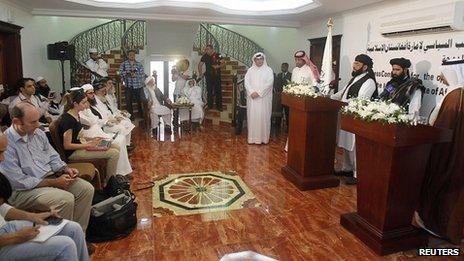US and Taliban to open direct peace talks in Qatar
- Published
- comments

The US is to open direct peace talks with the Taliban, senior White House officials have announced.
The first meeting is due to take place in the coming days in Doha, Qatar, where the Taliban have just opened their first official overseas office.
Afghan President Hamid Karzai said his government was also sending delegates to Qatar to talk to the Taliban.
The announcement came on the day Nato handed over security for the whole of Afghanistan to government forces.
Pakistan, which was involved in background talks for the opening of the Taliban office in Qatar, welcomed the announcement.
US officials said prisoner exchanges would be one topic for discussion with the Taliban, but the first weeks will mainly be used to explore each other's agendas.
President Obama: "We don't anticipate this process will be easy or quick, but we must pursue it in parallel with our military approach"
However, the talks are on condition that the Taliban renounce violence, break ties with al-Qaeda and respect the Afghan constitution - including the rights of women and minorities.
US officials told reporters the first formal meeting between US and Taliban representatives was expected to take place in Doha next week, with talks between President Karzai's High Peace Council and the Taliban due a few days after that.
The level of trust between the Afghan government and the Taliban is described as "low".
In the past, the Taliban have always refused to meet President Karzai or his government, dismissing them as puppets of Washington.
Masoom Stanekzai, secretary of the High Peace Council, would not give a specific date for their talks but said they would take place "within days".
He told the BBC it was important that all sides should feel "confident and comfortable" at the beginning of the process.
"Eventually the talks should take place on Afghan soil. This is an Afghan issue. No-one other than Afghans can decide," he said.
US officials stressed that this was the first step on a very long road, adding that there was no guarantee of success.
After opening the "political bureau" in Doha alongside Qatari officials, Taliban representative Mohammed Naeem told reporters the group wanted good relations with Afghanistan's neighbours.
A Taliban statement said: "The Islamic Emirate of Afghanistan doesn't want any threats from Afghanistan soil to other countries, and neither permits anyone to threaten other countries using Afghanistan soil.
"We support a political and peaceful solution that ends Afghanistan's occupation, and guarantees the Islamic system and nationwide security."
The BBC's Paul Adams in Washington says these were key statements that US officials were expecting to hear.
Welcoming the prospect of direct talks between the US and Taliban, the Pakistani foreign ministry said that Islamabad was "ready to continue to facilitate the process to achieve lasting peace in Afghanistan in accordance with the wishes of the Afghan people".
Pakistan was one of the main backers of the Taliban when the movement swept to power in Afghanistan in the 1990s.
Correspondents say the Taliban is still thought to rely heavily on certain elements in Pakistan and that Pakistani co-operation will be crucial in convincing the Taliban to reach an agreement with the Afghan government.
Security handover
A US official said the militant Haqqani network would also be represented by the Taliban in Doha.
However, the senior US and Nato commander in Afghanistan, Gen Joseph Dunford, cast doubt on whether the group would make peace.
Speaking by phone from Kabul he told reporters at the Pentagon: "All I've seen of the Haqqani would make it hard for me to believe they were reconcilable."
Grossman: announcement of US-Taliban talks marks 'beginning of a long road'
In Afghanistan itself on Tuesday, Nato handed over security for the whole of the country to the government for the first time since the Taliban were ousted in 2001.
At a ceremony in Kabul, President Hamid Karzai said that from Wednesday "our own security and military forces will lead all the security activities".
The ceremony saw the Nato-led International Security Assistance Force (Isaf) hand over control of the last 95 districts in a transition process that began in 2011.
International troops are to remain in Afghanistan until the end of 2014, providing military back-up when needed.
President Karzai has expressed anger at previous US and Qatari efforts to kick-start the peace process without properly consulting his government, reports the BBC's Bilal Sarwary from Kabul.
There is also concern within the presidential palace that the Taliban will use the office in Qatar to raise funds, adds our correspondent.
The US has previously tried to negotiate with the Taliban, but never held direct talks.
In March 2012 the Taliban said it had suspended preliminary negotiations with Washington, citing US efforts to involve the Afghan government as a key stumbling block.
The Taliban set up a diplomatic presence in Qatar in January 2012 and US officials held preliminary discussions there.